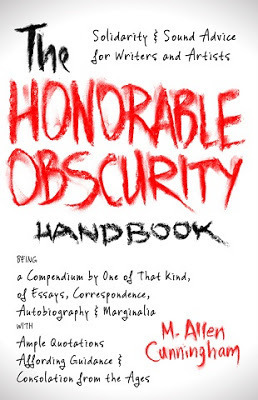M. Allen Cunningham's Blog, page 16
August 13, 2013
Announcing the Beauty of Ordinary Things Pre-Order Campaign!
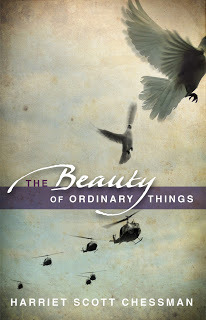 THE BOOK:
THE BOOK:This November, Atelier26 will proudly publish The Beauty of Ordinary Things , the powerful new novel by acclaimed writer Harriet Scott Chessman.
The story of the unexpected love between a young Vietnam veteran and a Benedictine nun, The Beauty of Ordinary Things is a deeply felt, luminously moving book, and we know readers will love it as much as we do. Here’s what Debra Dean, celebrated author of The Madonnas of Leningrad, has to say about the novel:
“Like Annie Dillard, Chessman plumbs the mysteries of the spirit and celebrates the quiet grace notes of the earth. The Beauty of Ordinary Things is deep as a prayer, a meditation on two people seeking their right place in the world. This book speaks softly, but oh how it lingers in the mind. I can’t praise it enough.”—Debra Dean, author of The Madonnas of Leningrad and The Mirrored WorldTHE CAMPAIGN:
New, flexible printing technologies have made it more widely possible than ever for unconventional publishers without huge capital (that's us!) to produce finely designed paperbacks, and we’ve got a nice, practicable print-run set to go for Chessman’s novel. The challenge of monetary resources, however, is no small one for a micro-press founded on the belief that idiosyncratic works of quiet merit have an integral place in literary culture, that literary history is largely built upon such works, that independent bookstores deserve to have a hand in the game, and that print books remain relevant and irreplaceable.
We've tossed our hat in the ring for grants, etc., but in the end nothing beats the straight-up support of readers making a direct purchase. That’s why we’re hoping you’ll help us give us Harriet Chessman’s rich and moving novel the powerful launch it deserves by helping us bolster its starting print-run and our promotional capacity.
By simply pre-ordering through this campaign and receiving for your enjoyment the book itself (along with one-of-a-kind perks!), you’ll be investing in the life of a wonderfully unconventional and, yes, beautiful novel, and you’ll be helping us realize our quixotic editorial vision to bring you the finest contemporary fiction in strikingly designed paperback editions. Attaining even half of our stated goal will greatly augment the novel's launch (we make good use of all funds).
THE DEAL: A pre-order of $17.00 (cost of book, plus shipping) gets you The Beauty of Ordinary Things along with a special letter-pressed excerpt from Harriet Scott Chessman’s work, signed by the author.
A pre-order of $35.00 gets you the above, plus a copy of Atelier26 publisher M. Allen Cunningham’s limited-edition short story collection Date of Disappearance, signed and numbered by the author, and featuring ten illustrations by artist Nathan Shields (this offer limited to 30 recipients).Note: please disregard the "donate" language on the campaign page (it's a quirk of the interface we're using there). Simply click on either the $17 pre-order choice, or the $35 one.
In addition to the gifts mentioned above, everyone placing a pre-order through the campaignwill be entered in regular drawings to receive any of a number of lovely and distinctive prizes throughout the life of the campaign. Follow the campaign's progress at the Atelier26 site, where we'll be posting frequent updates.
PRE-ORDER NOW
View Progress
The Beauty of Ordinary Things pre-order campaign closes on Sunday, September 8th, 2013.
Many thanks for your solidarity, and your support of independent publishing.
Viva, readers!
M. Allen Cunningham, August 18, 2013
Advance Praise for Harriet Scott Chessman’s The Beauty of Ordinary Things:
“A profoundly moving story of love’s possibilities, powers, and consolations.”—Priscilla Gilman, author of The Anti-Romantic ChildThe Atelier26 Motto: "A magnificent enthusiasm, which feels as if it never could do enough to reach the fullness of its ideal; an unselfishness of sacrifice, which would rather cast fruitless labour before the altar than stand idle in the market." --John Ruskin
“Quite simply stunning. In an exquisite few pages, Harriet Scott Chessman delivers a gigantic story.”—Meg Waite Clayton, New York Times bestselling author of The Wednesday Daughters
“Stays with one, hauntingly, long after one finishes reading.”—Maud Carol Markson, author of Looking After Pigeon
Published on August 13, 2013 23:42
July 18, 2013
Small Press and Lauded Author Team Up for Fresh Approach to Literary Publishing
Exciting news from M. Allen Cunningham's Atelier26 Books!
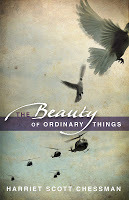 (July 18, 2013, Portland, Oregon) Atelier26 Books announces the acquisition of acclaimed author Harriet Scott Chessman’s new novel,
The Beauty of Ordinary Things
, for publication November, 2013.
(July 18, 2013, Portland, Oregon) Atelier26 Books announces the acquisition of acclaimed author Harriet Scott Chessman’s new novel,
The Beauty of Ordinary Things
, for publication November, 2013.
Chessman is the author of three previous novels, including the #1 Indie Next Pick and book-club favorite Lydia Cassatt Reading the Morning Paper as well as the Good Morning America Book Club selection and San Francisco Chronicle top pick Someone Not Really Her Mother . Her fiction has been translated into ten languages.
With The Beauty of Ordinary Things, Chessman has fashioned a powerful new story about our yearning for wholeness and the enduring weight of our briefest encounters.
Back from a tour of duty in Vietnam, Benny Finn, eldest son in a large Irish-American family, strives to find his bearings amid the everyday life of 1973 New England. At a Benedictine abbey in rural New Hampshire, Sister Clare, a young novice, confronts the day-to-day realities of a cloistered existence. Linking these two is Isabel Howell, a college student soon to discover that she must chart the course of her own life in a way she could not have imagined.
Deeply felt, often luminously moving, The Beauty of Ordinary Things carries forward the promise of Harriet Scott Chessman’s earlier work, revealing a writer richly aware of the range of human tragedy and tenderness.
Atelier26 Books, an independent press in Portland, Oregon, was founded in autumn 2011 with the aim to publish fiction by contemporary writers in fine paperback editions showcasing the highest design standards. At the core of the Atelier26 publishing philosophy are five beliefs the house seeks to boldly embody: “1) Idiosyncratic works of quiet merit have an integral place in literary culture; 2) Literary history is largely built upon such works; 3) Print books remain relevant and irreplaceable; 4) Dynamic independent booksellers across the nation are essential to a healthy publishing climate; 5) Authors deserve liberating rights agreements and royalty structures.”
The first Atelier26 title, Date of Disappearance: Assorted Stories by M. Allen Cunningham, appeared spring 2012 in an illustrated limited-edition of 300 copies, each signed and numbered by the author. That title and a subsequent nonfiction book were offered exclusively to independent bookstores for retail. While the house plans to widen its distribution with the release of Chessman’s novel, Atelier26 will retain its vision of “shining a light on the nation’s best indie bookstores.”
About her partnership with the unconventional micro-press, Chessman said, “I am honored and thrilled to be part of this new venture, Atelier26, whose mission is unsurpassed in integrity and vision.”For more information, please contact:Atelier26 publisher M. Allen Cunninghamatelier26books [at] gmail [dot] com
 (July 18, 2013, Portland, Oregon) Atelier26 Books announces the acquisition of acclaimed author Harriet Scott Chessman’s new novel,
The Beauty of Ordinary Things
, for publication November, 2013.
(July 18, 2013, Portland, Oregon) Atelier26 Books announces the acquisition of acclaimed author Harriet Scott Chessman’s new novel,
The Beauty of Ordinary Things
, for publication November, 2013.Chessman is the author of three previous novels, including the #1 Indie Next Pick and book-club favorite Lydia Cassatt Reading the Morning Paper as well as the Good Morning America Book Club selection and San Francisco Chronicle top pick Someone Not Really Her Mother . Her fiction has been translated into ten languages.
With The Beauty of Ordinary Things, Chessman has fashioned a powerful new story about our yearning for wholeness and the enduring weight of our briefest encounters.
Back from a tour of duty in Vietnam, Benny Finn, eldest son in a large Irish-American family, strives to find his bearings amid the everyday life of 1973 New England. At a Benedictine abbey in rural New Hampshire, Sister Clare, a young novice, confronts the day-to-day realities of a cloistered existence. Linking these two is Isabel Howell, a college student soon to discover that she must chart the course of her own life in a way she could not have imagined.
Deeply felt, often luminously moving, The Beauty of Ordinary Things carries forward the promise of Harriet Scott Chessman’s earlier work, revealing a writer richly aware of the range of human tragedy and tenderness.
Atelier26 Books, an independent press in Portland, Oregon, was founded in autumn 2011 with the aim to publish fiction by contemporary writers in fine paperback editions showcasing the highest design standards. At the core of the Atelier26 publishing philosophy are five beliefs the house seeks to boldly embody: “1) Idiosyncratic works of quiet merit have an integral place in literary culture; 2) Literary history is largely built upon such works; 3) Print books remain relevant and irreplaceable; 4) Dynamic independent booksellers across the nation are essential to a healthy publishing climate; 5) Authors deserve liberating rights agreements and royalty structures.”
The first Atelier26 title, Date of Disappearance: Assorted Stories by M. Allen Cunningham, appeared spring 2012 in an illustrated limited-edition of 300 copies, each signed and numbered by the author. That title and a subsequent nonfiction book were offered exclusively to independent bookstores for retail. While the house plans to widen its distribution with the release of Chessman’s novel, Atelier26 will retain its vision of “shining a light on the nation’s best indie bookstores.”
About her partnership with the unconventional micro-press, Chessman said, “I am honored and thrilled to be part of this new venture, Atelier26, whose mission is unsurpassed in integrity and vision.”For more information, please contact:Atelier26 publisher M. Allen Cunninghamatelier26books [at] gmail [dot] com
Published on July 18, 2013 12:48
June 23, 2013
Being Obscure
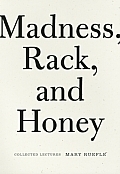 Reading (savoring!) Mary Ruefle's astonishing
Madness, Rack, and Honey
this morning (don't miss this book -- it's glorious), I discovered the following in the essay "I Remember, I Remember," a passage whose thought may lie nicely alongside my
Honorable Obscurity Handbook
:
Reading (savoring!) Mary Ruefle's astonishing
Madness, Rack, and Honey
this morning (don't miss this book -- it's glorious), I discovered the following in the essay "I Remember, I Remember," a passage whose thought may lie nicely alongside my
Honorable Obscurity Handbook
:"I remember that I did not always know authors were ordinary people leading ordinary lives, and that an ordinary life was an obscure life, if we can extend the meaning of obscure to mean covered up by dailiness, glorious dailiness, shameful dailiness, dailiness that is difficult to figure out, that is not always clear until a long time afterward. Obscure: not readily noticed, easily understood, or clearly expressed. Which is a pretty good definition of life." (p.242)
 The question at the heart of The Honorable Obscurity Handbook, the question the book puts to its readers or prospective readers, is: Are you honorably obscure? At first this sounds like a provocation, a challenge; i.e., Are you above it all? And that is, of course, part of the meaning. But more importantly, "Are you honorably obscure?" is meant as an invitation, a gesture of welcome, four words preceding an embrace.
The question at the heart of The Honorable Obscurity Handbook, the question the book puts to its readers or prospective readers, is: Are you honorably obscure? At first this sounds like a provocation, a challenge; i.e., Are you above it all? And that is, of course, part of the meaning. But more importantly, "Are you honorably obscure?" is meant as an invitation, a gesture of welcome, four words preceding an embrace."Are you honorably obscure?"
The question bears inside it, implicitly, the inclusive affirmative: You probably are, because, after all, most of us are.
Published on June 23, 2013 11:03
May 31, 2013
“Cunningham Has Wrestled Alligators Professionally,” Or: Variations on My Author Bio
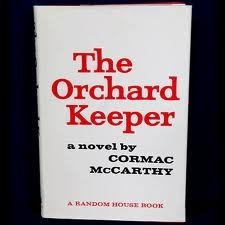 Gone, gone are the days when back-flap author bios were actually biographical in nature. Consider this artifact, from the rear of Cormac McCarthy’s 1965 debut, The Orchard Keeper. “Cormac McCarthy was born in Rhode Island in 1933,” it begins, “but moved to Knoxville, Tennessee, at the age of four.” We go on to learn that the author graduated high school in 1951 and then enrolled at the University of Tennessee where his performance “was so poor that he was asked not to return,” that he joined the Air Force in 1953 and spent of half of his four-year enlistment in Alaska, that he returned to university for four years but never got that degree, and that he “began work on The Orchard Keeper in 1959, but the necessities of life delayed its completion.”
Gone, gone are the days when back-flap author bios were actually biographical in nature. Consider this artifact, from the rear of Cormac McCarthy’s 1965 debut, The Orchard Keeper. “Cormac McCarthy was born in Rhode Island in 1933,” it begins, “but moved to Knoxville, Tennessee, at the age of four.” We go on to learn that the author graduated high school in 1951 and then enrolled at the University of Tennessee where his performance “was so poor that he was asked not to return,” that he joined the Air Force in 1953 and spent of half of his four-year enlistment in Alaska, that he returned to university for four years but never got that degree, and that he “began work on The Orchard Keeper in 1959, but the necessities of life delayed its completion.”From our distant vantage point in this age of “platforms” and all-encompassing commodification, doesn’t the McCarthy sketched here look distinctly, even perversely “unreliable”; i.e. unmarketable? Where are the guy’s creds? Where, for heaven’s sake, is the branding?
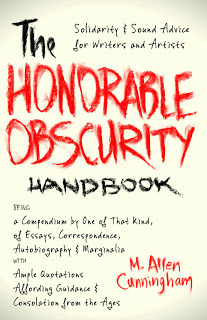 Today’s author bio, we all realize, is prime real estate. It is an ersatz CV precisely calibrated to persuade potential consumers of the author’s “content-providing” capacity and — more importantly — to encourage the outlay of cash in the amount of the cover price. Let us move units and never pause. Not only do I understand this, but I’ve done a great deal of market research. So today, after an in-depth comparative study of years, I’m proud to announce that I have identified each of the discrete author classifications (seven in all) that characterize contemporary publishing. I’ve done so, dear reader, in order to furnish you my own author bio in each of the seven variations! For the first time ever, the M. Allen Cunningham you prefer most can be yours, and you will, I trust, happily proceed therewith to your purchase of his latest title, The Honorable Obscurity Handbook. I am here to serve. Behold:
Today’s author bio, we all realize, is prime real estate. It is an ersatz CV precisely calibrated to persuade potential consumers of the author’s “content-providing” capacity and — more importantly — to encourage the outlay of cash in the amount of the cover price. Let us move units and never pause. Not only do I understand this, but I’ve done a great deal of market research. So today, after an in-depth comparative study of years, I’m proud to announce that I have identified each of the discrete author classifications (seven in all) that characterize contemporary publishing. I’ve done so, dear reader, in order to furnish you my own author bio in each of the seven variations! For the first time ever, the M. Allen Cunningham you prefer most can be yours, and you will, I trust, happily proceed therewith to your purchase of his latest title, The Honorable Obscurity Handbook. I am here to serve. Behold:1) The AuthorM. Allen Cunningham is the author of two acclaimed novels, The Green Age of Asher Witherow and Lost Son, and the illustrated, limited-edition story collection Date of Disappearance. He is the co-founder of the cultural commentary blog Soul Shelter and the recipient of fellowships from the Oregon Arts Commission, Literary Arts, and Yaddo. Cunningham lives in Portland, Oregon.
The Honorable Obscurity Handbook is now for sale from Atelier26 Books.2) The CollegiateM. Allen Cunningham earned his MFA at the University of Long Walks and Artistic Struggle. The recipient of numerous trans-chronological fellowships, he has studied at Walden Pond with Henry Thoreau, in Northern California with John Steinbeck and Wallace Stegner, in Switzerland, Germany, and France with Rainer Maria Rilke, and in London with John Keats and William Shakespeare. He is a current Writer in Residence in the Blue Room at Powell’s Books, Portland, Oregon. He teaches writing to himself on a daily basis.3) The Everyman (aka The Working Stiff)M. Allen Cunningham has worked as a swimming instructor, a housepainter, a hospital purchasing agent, a file clerk, a commercial mortgage administrative assistant, a housepainter, a retail merchandiser, a copy-machine operator, a housepainter, a ranch caretaker, and a bookseller. He has delivered flowers in the middle of the day and newspapers in the dead of night, and he has painted houses. He’s lived in seven different apartments in six different cities and agrees that life, like housepainting, can be tough and you’ve got to be resilient. Through it all, he’s kept on writing.4) The Embellisher (aka The Personality)M. Allen Cunningham mastered the art of miming at nineteen months of age and later, a toddler runaway, supported himself as a sought-after street performer in Las Vegas. At seven he joined a cult in Delaware having to do with oven mitts, but upon his selection as the cult’s new Grand Master he elected to leave in order to devote himself to a prize career wrestling alligators. He is the founder of the Antarctic Thespian Society, is a nationally accredited porcupine-trainer, and has memorized Moby-Dick in its entirety.5) The HonoredM. Allen Cunningham is President Emeritus of the American Academy of Words, Phrases, and Sentences. He is Chair of the Board of American Paragraphs, which he founded with Gore Vidal in 1958. He has received all of the highest literary honors, including the Eminently Finished Manuscript Prize, the Novelist’s Gratification Award, the Four-Hundredth Draft Literary Fellowship, and the Best Possible Book of All Books With This Particular Title Award. Just hand him the next prize, please. He will place it beside his Royal HH typewriter.6) The WitM. Allen Cunningham gets a kick out of anagrams like Prenatal/Parental, often brings up Maslow’s Pyramid in spousal arguments, and wishes Occam’s Razor were considered more cutting edge. He lives in Portland, Oregon, in an old creaky house with fourteen cats but no mice, where he tinkers away on a Royal HH typewriter. He hopes you like the sweater vest he’s sporting semi-ironically in his author photo.7) The AbbreviatorM. Allen Cunningham is a writer.
Published on May 31, 2013 14:29
May 29, 2013
Prime Passage: Leon Wieseltier's Defense of the Humanities
The following comes from Wieseltier's May 19th commencement speech at Brandeis University. Read the whole speech in The New Republic.
"There is no task more urgent in American intellectual life at this hour than to offer some resistance to the twin imperialisms of science and technology, and to recover the old distinction — once bitterly contested, then generally accepted, now almost completely forgotten – between the study of nature and the study of man. As Bernard Williams once remarked, “’humanity’ is a name not merely for a species but also for a quality." You who have elected to devote yourselves to the study of literature and languages and art and music and philosophy and religion and history — you are the stewards of that quality. You are the resistance. You have had the effrontery to choose interpretation over calculation, and to recognize that calculation cannot provide an accurate picture, or a profound picture, or a whole picture, of self-interpreting beings such as ourselves; and I commend you for it.
"Do not believe the rumors of the obsolescence of your path. If Proust was a neuroscientist, then you have no urgent need of neuroscience, because you have Proust. If Jane Austen was a game theorist, then you have no reason to defect to game theory, because you have Austen. There is no greater bulwark against the twittering acceleration of American consciousness than the encounter with a work of art, and the experience of a text or an image. You are the representatives, the saving remnants, of that encounter and that experience, and of the serious study of that encounter and that experience – which is to say, you are the counterculture. Perhaps culture is now the counterculture.
"So keep your heads. Do not waver. Be very proud. Use the new technologies for the old purposes. Do not be rattled by numbers, which will never be the springs of wisdom. In upholding the humanities, you uphold the honor of a civilization that was founded upon the quest for the true and the good and the beautiful. For as long as we are thinking and feeling creatures, creatures who love and imagine and suffer and die, the humanities will never be dispensable. From this day forward, then, act as if you are indispensable to your society, because – whether it knows it or not – you are."
"There is no task more urgent in American intellectual life at this hour than to offer some resistance to the twin imperialisms of science and technology, and to recover the old distinction — once bitterly contested, then generally accepted, now almost completely forgotten – between the study of nature and the study of man. As Bernard Williams once remarked, “’humanity’ is a name not merely for a species but also for a quality." You who have elected to devote yourselves to the study of literature and languages and art and music and philosophy and religion and history — you are the stewards of that quality. You are the resistance. You have had the effrontery to choose interpretation over calculation, and to recognize that calculation cannot provide an accurate picture, or a profound picture, or a whole picture, of self-interpreting beings such as ourselves; and I commend you for it.
"Do not believe the rumors of the obsolescence of your path. If Proust was a neuroscientist, then you have no urgent need of neuroscience, because you have Proust. If Jane Austen was a game theorist, then you have no reason to defect to game theory, because you have Austen. There is no greater bulwark against the twittering acceleration of American consciousness than the encounter with a work of art, and the experience of a text or an image. You are the representatives, the saving remnants, of that encounter and that experience, and of the serious study of that encounter and that experience – which is to say, you are the counterculture. Perhaps culture is now the counterculture.
"So keep your heads. Do not waver. Be very proud. Use the new technologies for the old purposes. Do not be rattled by numbers, which will never be the springs of wisdom. In upholding the humanities, you uphold the honor of a civilization that was founded upon the quest for the true and the good and the beautiful. For as long as we are thinking and feeling creatures, creatures who love and imagine and suffer and die, the humanities will never be dispensable. From this day forward, then, act as if you are indispensable to your society, because – whether it knows it or not – you are."
Published on May 29, 2013 08:36
May 14, 2013
The Honorable Obscurity Handbook Has Arrived!
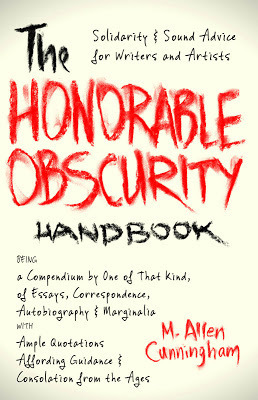 NOW FOR SALETaking a cue from Tillie Olsen's Silences and the works of Alain de Botton, The Honorable Obscurity Handbook is novelist M. Allen Cunningham's gloriously uncynical answer to a publishing world awash in cynical careerism and bottom-line thinking. Part consoling sourcebook, part cultural commentary, part wry self-help manual, and part inspirational anthology, this slim volume is a celebration of the creative spirit. It is packed with insights relevant to any creative worker, whatever their field.
NOW FOR SALETaking a cue from Tillie Olsen's Silences and the works of Alain de Botton, The Honorable Obscurity Handbook is novelist M. Allen Cunningham's gloriously uncynical answer to a publishing world awash in cynical careerism and bottom-line thinking. Part consoling sourcebook, part cultural commentary, part wry self-help manual, and part inspirational anthology, this slim volume is a celebration of the creative spirit. It is packed with insights relevant to any creative worker, whatever their field."They're out there. Day and night, in any given locale, they're hard at it. Our novelists and poets, who strive away in shabby rooms, reverse the formula daily: they live in order to work. But their work helps us to live. They win no honors and receive no grants. They hobnob with no famous elders. Yet they comprise, in their dedication and lack of 'prospects,' a force of pure, unpaid human creativity in service to something larger and more lasting than themselves. Their incentive? Destiny. Their inspiration when faced with privation and self-doubt? Bygone literary gods who struggled much the same. Their rewards: How to name them? But they more than mitigate the annoyances of thin wallets, scant praise, nonexistent reputations."-M. Allen Cunningham, from the intro
ISBN: 978-0-9893023-0-2
Retail Price: $14.00 218 pages (on recycled, acid-free paper) 5.5. x 8.5
Published on May 14, 2013 20:32
May 3, 2013
Prime Passage: Nicholas Carr's Rough Type Blog
Carr, author of the Pulitzer finalist
The Shallows: What the Internet Is Doing to Our Brains
(W.W. Norton, 2010), never fails to cut to the quick in the cultural commentary on his occasional "Rough Type" blog. As contemporary interpreter of the fetishism, solipsism, and pervasive absurdities that characterize the technocrats of Silicon Valley, Carr is among the best.
The following is from a very recent Rough Type post about Facebook and its new TV ad campaigns.
"...Every object, at least in our perception of it, carries its antithesis. Behind the plenitude symbolized by the vase we sense an emptiness: the wilted bouquet rotting in a landfill. And so it is with the tools of communication. When we look at them we sense not only the possibility of connection but also, as a shadow, the inevitability of loneliness. An empty mailbox. A sheet of postage stamps. A telephone in its cradle. The dial of a radio. The dark screen of a television in the corner of a room. A cell phone plugged into an outlet and recharging, like a patient in a hospital receiving a transfusion. The melancholy of communication devices is rarely mentioned, but it has always haunted our homes.
"Home and Away are the poles of our being, each exerting a magnetic pull on the psyche. We vibrate between them. Home is comforting but constraining. Away is liberating but lonely. When we’re Home, we dream of Away, and when we’re Away, we dream of Home. Communication tools have always entailed a blurring of Home and Away. Newspaper, phonograph, radio, and TV pulled a little of Away into Home, while the telephone, and before it the mail, granted us a little Home when we were Away. Some blurring is fine, but we don’t want too much of it. We don’t want the two poles to become one pole, the magnetic forces to cancel each other out. The vibration is what matters, what gives beauty to both Home and Away. Facebook Home, in pretending to give us connection without the shadow of loneliness, gives us nothing. It’s Nowheresville."
The following is from a very recent Rough Type post about Facebook and its new TV ad campaigns.
"...Every object, at least in our perception of it, carries its antithesis. Behind the plenitude symbolized by the vase we sense an emptiness: the wilted bouquet rotting in a landfill. And so it is with the tools of communication. When we look at them we sense not only the possibility of connection but also, as a shadow, the inevitability of loneliness. An empty mailbox. A sheet of postage stamps. A telephone in its cradle. The dial of a radio. The dark screen of a television in the corner of a room. A cell phone plugged into an outlet and recharging, like a patient in a hospital receiving a transfusion. The melancholy of communication devices is rarely mentioned, but it has always haunted our homes.
"Home and Away are the poles of our being, each exerting a magnetic pull on the psyche. We vibrate between them. Home is comforting but constraining. Away is liberating but lonely. When we’re Home, we dream of Away, and when we’re Away, we dream of Home. Communication tools have always entailed a blurring of Home and Away. Newspaper, phonograph, radio, and TV pulled a little of Away into Home, while the telephone, and before it the mail, granted us a little Home when we were Away. Some blurring is fine, but we don’t want too much of it. We don’t want the two poles to become one pole, the magnetic forces to cancel each other out. The vibration is what matters, what gives beauty to both Home and Away. Facebook Home, in pretending to give us connection without the shadow of loneliness, gives us nothing. It’s Nowheresville."
Published on May 03, 2013 00:10
April 30, 2013
Prime Passage: And Our Faces, My Heart, Brief as Photos by John Berger
"Poems, even when narrative, do not resemble stories. All stories are about battles, of one kind or another, which end in victory and defeat. Everything moves towards the end, when the outcome will be known.
"Poems, regardless of any outcome, cross the battlefields, tending the wounded, listening to the wild monologues of the triumphant or the fearful. They bring a kind a kind of peace. Not by anaesthesia or easy reassurance, but by recognition and the promise that what has been experienced cannot disappear as if it had never been. Yet the promise is not of a monument. (Who, still on a battlefield, wants monuments?) The promise is that language has acknowledged, has given shelter, to the experience which demanded, which cried out.
"Poems are nearer to prayers than stories, but in poetry there is no one behind the language being prayed to. It is the language itself which has to hear and acknowledge. For the religious poet, the Word is the first attribute of God. In all poetry words are a presence before they are a means of communication."
--pages 21-22
"Poems, regardless of any outcome, cross the battlefields, tending the wounded, listening to the wild monologues of the triumphant or the fearful. They bring a kind a kind of peace. Not by anaesthesia or easy reassurance, but by recognition and the promise that what has been experienced cannot disappear as if it had never been. Yet the promise is not of a monument. (Who, still on a battlefield, wants monuments?) The promise is that language has acknowledged, has given shelter, to the experience which demanded, which cried out.
"Poems are nearer to prayers than stories, but in poetry there is no one behind the language being prayed to. It is the language itself which has to hear and acknowledge. For the religious poet, the Word is the first attribute of God. In all poetry words are a presence before they are a means of communication."
--pages 21-22
Published on April 30, 2013 17:17
April 27, 2013
Forthcoming (in print), spring 2013
Published on April 27, 2013 10:02
March 29, 2013
Prime Passage: Self-Consciousness by John Updike
“My first books met with the criticism that I wrote all too well but had nothing to say: I, who seemed to myself full of things to say, who had all of Shillington to say, Shillington and Pennsylvania and the whole mass of middling, hidden, troubled America to say, and who had seen and heard things in my two childhood homes, as my parents’ giant faces revolved and spoke, achieving utterance under some terrible pressure of American disappointment, that would take a lifetime to sort out, particularize, and extol with the proper dark beauty. … What I doubted was not the grandeur and plenitude of my topic but my ability to find the words to express it; every day, I groped for the exact terms I knew were there but could not find, pawed through the thesaurus in search of them and through the dictionary in search of their correct spelling. My English language had been early bent by the German locutions of my environment, and, as my prose came to be edited by experts, I had to arbitrate between how I in my head heard a sentence go and how, evidently, it should correctly go. My own style seemed to me a groping and elemental attempt to approximate the complexity of envisioned phenomena and it surprised me to have it called luxuriant and self-indulgent; self-indulgent, surely, is exactly what it wasn’t — other-indulgent, rather. My models were the styles of Proust and Henry Green as I read them (one in translation): styles of tender exploration that tried to wrap themselves around the things, the tints and voices and perfumes, of the apprehended real. In this entwining and gently relentless effort there is no hiding that the effort is being made in language: all professorial or critical talk of inconspicuous or invisible language struck me as vapid and quite mistaken, for surely language, printed language, is what we all know we are reading and writing, just as a person looking at a painting knows he is not looking out of a window.”
(p.103-104)
(p.103-104)
Published on March 29, 2013 00:00

